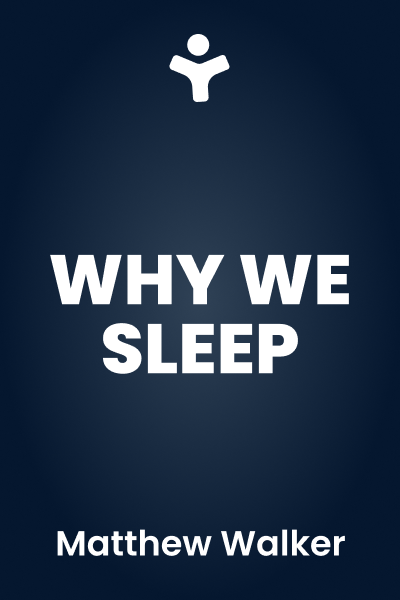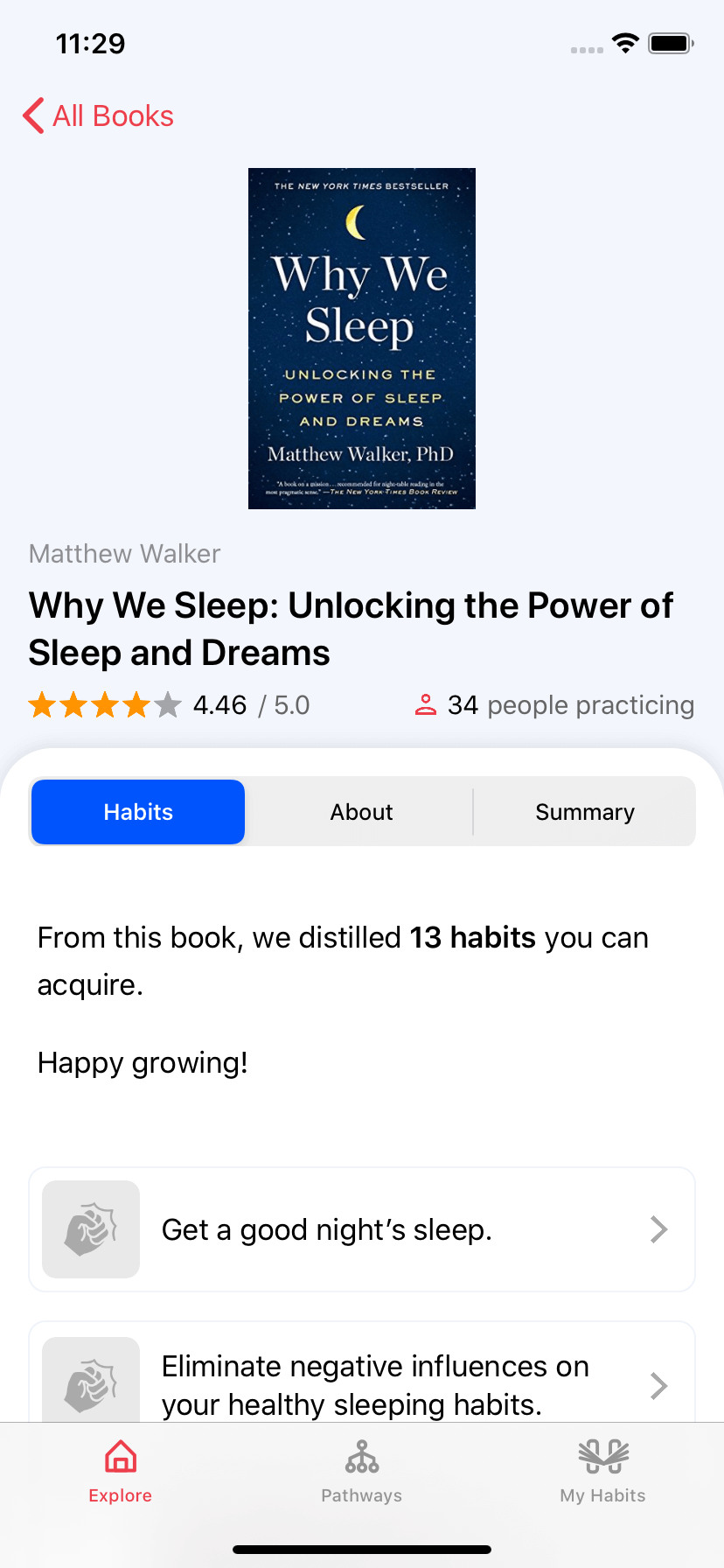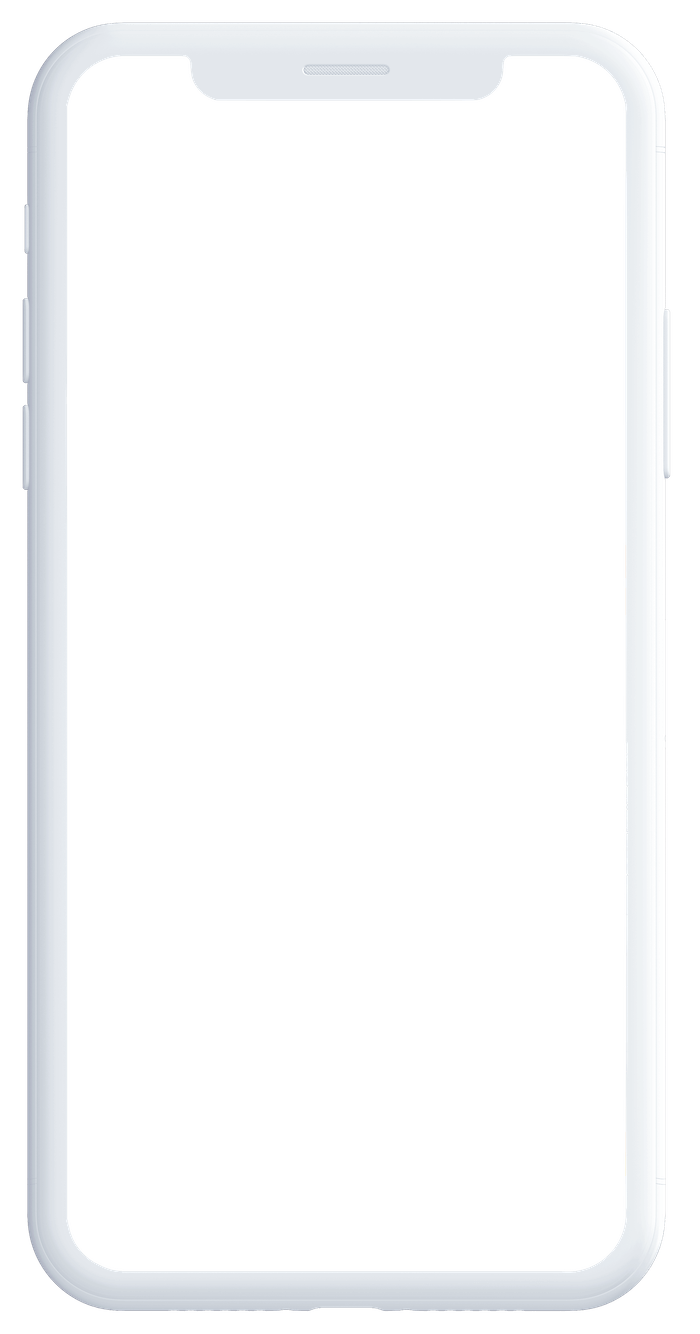
Why We Sleep: Unlocking the Power of Sleep and Dreams
by Matthew WalkerWhy We Sleep is a science book about the multitude of benefits obtained from healthy, natural sleep. Sleep is universal, and it is almost as old as time; however, the last century has witnessed a dramatic decrease in the amount of sleep the average person gets. This has resulted in a myriad of health problems and challenges.
Developed nations ought to emphasize the importance of good sleeping habits through education and changes in school and work environments. Moreover, individuals should consult medical professionals about possible therapies for lack of sleep prior to taking any type of sedation, which does not induce natural sleep.
This book elaborates on why sleep is so beneficial, why lack of sleep can be detrimental, and how to make life changes to improve our overall health. This book is gripping, thorough, and life-changing.
This Thing Called Sleep
“The shorter your sleep, the shorter your life span.”
It is believed that sleep is as old as life on this planet. Sleep managed to persevere throughout evolution, which is a strong indication that it provides humanity with a rich variety of health benefits.
Insufficient sleep has been identified as a key lifestyle factor determining whether or not you will develop Alzheimer’s disease. Lack of sleep wildly increases your chances of cardiovascular disease, stroke, and diabetes.
Sleep is tremendously complex and immensely relevant to the preservation of good health. Sleep significantly improves and enhances all the major organs in the human body, and it “enriches a diversity of functions, including our ability to learn, memorize, and make logical decisions and choices.”
We owe the strengthening of our immune system to healthy sleep. Moreover, sleep plays a major role in fighting malignancy and preventing all types of infections and illnesses. Sleep helps our bodies to maintain a balance of insulin and glucose, and it regulates our appetite, thus helping us control our body weight. All in all, healthy sleep contributes to a healthy life.
Sleep is the ultimate way to restart your body and your mind. By teaching yourself to go to bed at the right time to get adequate sleep, you create an environment for your body and your mind to function at their best the next day. Thus, your health will be preserved, and your mind will be fresh for all the challenges that await you.
Actions to take
Caffeine, Jet Lag, and Melatonin
“One cup of tea or coffee in the morning will last much of the day, and should they have a second cup, even early in the afternoon, they will find it difficult to fall asleep in the evening.”
Humans create their own endogenous circadian rhythm regardless of the presence of natural light. This twenty-four-hour bio clock is called the suprachiasmatic nucleus, and it controls a wide range of behaviors, such as wakefulness and sleep. This nucleus communicates to our brain whether it is day or night by using melatonin. Melatonin is released at night, and its function is to inform the brain and the body that it is dark. However, it does not play a direct role in our ability to fall asleep.
Not every person is the same: some are morning larks, some are night owls, and others are somewhere in between. This means that different types of people reach their peak productivity at slightly different times during the day. Moreover, this means that there are different points of time when they can fall asleep and wake up. Therefore, societal changes are required to produce more suitable and productive work schedules to accommodate all types of workers.
The invention of the jet engine had a negative impact on our circadian rhythm because it enabled people to travel through time zones quickly, resulting in jet lag. We feel tired during the day because, according to our internal clock, we feel as if it is nighttime. In addition, studies on airplane cabin crews have shown that they suffer from impaired short-term memory. The part of their brains responsible for learning has gotten smaller due to the stress of long-haul flights across many different time zones.
Sometimes we feel it is necessary to stay awake, so we use caffeine. Drinking beverages with caffeine later in the day means that your sleep will probably be disrupted. Still, when caffeine is fully eliminated from your system, your energy levels decrease rapidly.
Remember: If you could fall asleep a couple of hours after waking up in the morning, and if you cannot function before noon without caffeine, you are not getting enough sleep.
Actions to take
Ape Beds, Dinosaurs, and Napping with Half a Brain
“Should you ever have to give a presentation at work, for your own sake—and that of the conscious state of your listeners—if you can, avoid the midafternoon slot.”
All living beings in the animal kingdom share the bond of sleep. In fact, sleep is considered to be universal. However, there are many differences across species in the manner in which sleep occurs. Some animals sleep for a few minutes, some with half a brain at a time, and some for the greater part of the day.
There are two types of sleep stages that involve eye movements: non–rapid eye movement, or NREM, sleep, and rapid eye movement sleep, or REM.
There are differences in NREM and REM sleep depending on the animal. Humans, on average experience 75-80% NREM sleep and 20-25% REM sleep. Most adults in industrialized nations take a longer night slumber, which usually lasts for about seven hours. However, people of different tribes which do not live in modern society sleep for approximately seven hours during the night, but also take a one-hour nap in the afternoon.
The need for an afternoon nap is biological. Humans experience a decrease in alertness during the mid-afternoon hours, which has been recorded many times in history. This split in the amount of sleep is named biphasic sleep because it occurs in two (bi) phases.
Quality REM sleep, mentioned previously, is necessary for humans to be able to control and regulate their emotions on a daily basis, and also to think and act logically and reasonably. Moreover, one of the crucial evolutionary benefits of REM sleep is humans’ creativity. Deep NREM sleep helps in the creation of long-term memories, whereas REM is responsible for making connections between pieces of information, i.e. associations.
Being focused while maintaining everybody’s attention often depends on the time of the day when a meeting or a presentation takes place. Understanding humans’ biology and predispositions can help you become more productive and successful.
Actions to take
Changes in Sleep Across the Life Span
“Any individual, no matter what age, will exhibit physical ailments, mental health instability, reduced alertness, and impaired memory if their sleep is chronically disrupted.”
The benefits of quality REM sleep are innumerable. Any individual, at any age in life, experiences REM sleep, although its length varies based on the person’s age. Disruptions of REM sleep in fetuses can be caused if the mother consumes alcohol. The alcohol crosses the placental barrier, and the fetus’s brain will suffer suppression of REM sleep. As a result, future cognition will be impaired. Again, it can be determined that REM sleep “is not optional during early human life, but obligatory.”
By the age of four, the child’s behavior is dominated by the circadian rhythm. At this stage in life, children also experience biphasic sleep which means a longer night slumber and a nap during the day. As children grow older, they almost certainly discard the nap during the day and only sleep during the night.
Elderly individuals who experience sleeping problems are advised to consult a sleep doctor before taking a sleeping pill. The quality of sleep is usually lower in elderly people because they wake up more frequently during the night. One of the reasons is a weakened bladder from taking different medications. Also, they are advised to lower their fluid intake during the late hours of the day. A few lifestyle changes may contribute to a healthier sleeping pattern. A lower sleep efficiency score leads to higher mortality risk.
The benefits of quality REM sleep are manifold. Therefore, understanding from an early age which sleeping habits are harmful and which are beneficial, and acting accordingly, will play a crucial role in the quality of your life. Healthy sleep leads to a much healthier lifestyle.
Actions to take
Your Mother and Shakespeare Knew
“Sleep before learning refreshes our ability to initially make new memories.”
Making and retaining memories is directly related to the quality of sleep. Early-night NREM sleep is responsible for fact-based retention of memories. On the other hand, late-night REM sleep is responsible for the development of creativity and the creation of connections between pieces of information. Even daytime naps can help the process of memory consolidation as long as enough NREM sleep occurred.
Sleeping before and after learning increases our ability to learn and make new memories.
Short-term memories are transferred from the hippocampus to the cortex where they become long-term memories. Of course, not all short-term memories find their way to the cortex. Most of them are forgotten because forgetting is a healthy way to keep room for new short-term memories.
The quality of brainwaves during sleep is crucial for the brain’s consolidation. It is worth mentioning that different technologies are being developed that amplify sleep brainwaves. One of these technologies involves auditory tones which are synchronized with the individual’s sleeping brainwaves.
Sleeping for at least eight hours a night improves athletes’ performance. Therefore, it is essential to obtain a good night’s sleep in order to make great achievements.
The learning process is directly linked to the quality of NREM and REM sleep. The brain manages to create long-term memories and store relevant information if it is rested prior to the learning process, as well as following the learning process. Moreover, focusing on the information you wish to remember before going to sleep prepares the brain to focus on retaining that particular piece of information. Finally, healthy sleep leads to a healthy body and a healthy mind.
Actions to take
Too Extreme for the Guinness Book of World Records
“The best bridge between despair and hope is a good night’s sleep.”
Lack of healthy NREM and REM sleep can have disastrous consequences. One of them is connected to drowsy driving. Drowsy driving is different from drunk driving because while drowsy driving you experience a lack of control over your body and the absence of proper, life-saving reactions. Falling asleep at the wheel, although it does not happen very often, is almost definitely a factor in lost lives and damage. However, the microsleep, “a momentary lapse in concentration,” happens very often and almost certainly has grave consequences.
Lack of sleep interferes with a person’s mood and often causes a person to experience inexplicable rage. “Insufficient sleep has also been linked to aggression, bullying, and behavioral problems in children across a range of ages.” This correlation between lack of sleep and aggression has been witnessed and documented in prisons.
Inadequate sleep is also associated with relapses in patients with a history of drug abuse.
The onset of different types of dementia is strongly connected to insufficient sleep. Memories which are formed during hours where a person does not experience quality sleep are weak memories that tend to be lost.
Actions to take
iPads, Factory Whistles, and Nightcaps
“Artificial light in modern societies thus tricks us into believing night is still day, and does so using a physiological lie.”
Electric light has made a tremendous change in people’s perception of night and day. Even the softest artificial light can trick the brain into thinking that it is day, thus delaying the release of melatonin which informs the brain that it is nighttime. Hence, your internal clock is rewound for at least a couple of hours every evening.
With the development of modern technology, many of us bring our phones, iPads, and laptops into the bedroom. This LED light interferes with our sleep and causes a delay in the release of melatonin.
In order to acquire a good night’s sleep, many people are tricked into believing that alcohol helps them achieve quality sleep. Alcohol is a sedative, and sedation is not to be confused with sleep. Although it helps people move out of wakefulness, it “does not induce natural sleep.” To make things even worse, alcohol breaks sleep. This fragmented sleep can be quite dangerous in the long run because it suppresses REM sleep.
Things that can help people achieve quality sleep include a suitable room temperature—around 65 degrees Fahrenheit (18.3°C) because a cooler room improves sleep. Also, having a warm bath before going to bed can cause a significant improvement in a person’s quality of sleep. Finally, the constant use of alarm clocks may have an immensely negative effect on the cardiovascular system in humans, so strive to reduce your reliance on alarm clocks.
Making simple changes in the bedroom can improve sleep quality on many levels. Since numerous health problems are connected to a lack of sleep, these changes will improve your well-being.
Actions to take
Hurting and Helping Your Sleep
“Sleeping pills do not provide natural sleep, can damage health, and increase the risk of life-threatening diseases.”
People who experience sleep problems frequently believe that taking sleeping pills will solve their problems. Millions of pills have been prescribed to help patients sleep for at least a few hours. However, it is highly important to note that pills do not provide natural sleep. Moreover, they increase the risk of numerous life-threatening diseases.
Before deciding to take sleeping pills, people are advised to consult sleep doctors. Various methods can be used to improve sleep, and these methods do not involve sedatives or other substances that do not induce natural sleep.
When examined, the brains of people who take sleeping pills show that they lack the deepest brain waves usually found in natural, healthy sleep.
Another side effect to taking sleeping pills over a longer period is rebound insomnia. When people stop taking the pills, their sleeping situation usually worsens.
In addition, pill-induced sleep does not provide the same health benefits as natural sleep. It does not have the same restorative effect, and it does not strengthen the immune system. Since this is not natural sleep, it often leaves people groggy and lacking alertness. As a result of this drowsiness, car crashes may happen and lives can be lost.
Presently, the most effective therapy is called cognitive behavioral therapy for insomnia, or CBT-I. Therapists provide patients with a variety of techniques to help them develop new, healthy sleeping habits.
Furthermore, a small, but significant change in a person’s eating habits might prove to be the deciding factor for obtaining a good night’s sleep. For instance, food rich in sugar but low in fiber may result in less deep NREM and fragmented sleep.
Making decisions about your health should follow a consultation with a medical professional. Trying to achieve natural sleep without the use of sleeping pills can often be achieved through the use of different techniques and therapies. Sleep is one of the most important aspects of our lives, responsible for keeping us healthy and able to make new memories and learn new things.
Actions to take
A New Vision for Sleep in the Twenty-First Century
“Educating people about sleep—through books, engaging lectures, or television programs—can help combat our sleep deficit.”
Although people have experienced much more healthy sleep in the past, i.e. before the rise of technology and the industrial age, it would be nonsensical to advise the entire human race to relinquish the benefits of the modern age. Fighting against the use of technology would almost certainly prove to be in vain. Instead, we should try and use technology to our advantage to develop healthy sleeping habits that induce natural sleep.
Scientists and engineers have been working to produce devices that will track the individual’s circadian rhythm, and help create a pleasant, sleep-encouraging atmosphere in our homes. Such a suitable atmosphere will include a decrease in the temperature, the light in the room, etc. Perhaps even the LED light from our devices will be altered to stop emitting the type of light that tricks the brain into believing that it is still daytime. On the other hand, a light that becomes brighter and brighter can help individuals wake up earlier without the use of loud alarms. The body can be tricked into believing that it is daylight.
In order to make tremendous changes in people’s health and well-being, education and different media should be used to enlighten people about the benefits of natural sleep.
Actions to take
Don’t just read. Act.



